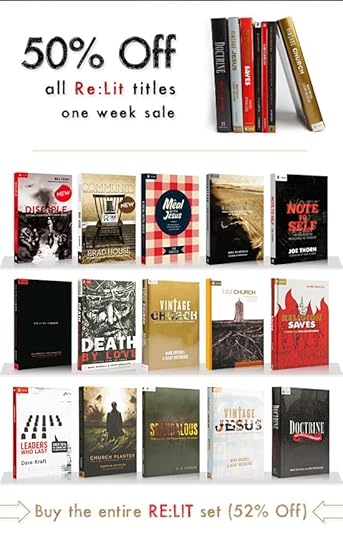Justin Taylor's Blog, page 279
October 7, 2011
The McGurk Effect: Is Seeing Believing?
The Greatest News in One Sentence
"That the greatest good (God) offers the greatest action (love) to the greatest need (wrath-owed sinners) by sending the greatest treasure (Jesus) in the greatest invitation (to everyone) into the greatest life (everlasting)."
"The death of Christ is the wisdom of God by which the love of God saves sinners from the wrath of God, all the while upholding and demonstrating the righteousness of God in Christ."
—John Piper, Desiring God, pp. 61-62.
How People Are Set Free from the Bondage of the Devil
 2 Timothy 2:24-26:
2 Timothy 2:24-26:
"The Lord's servant must not be quarrelsome but kind to everyone, able to teach, patiently enduring evil, correcting his opponents with gentleness.
God may perhaps grant them repentance leading to a knowledge of the truth, and they may come to their senses and escape from the snare of the devil, after being captured by him to do his will."
When Paul says that "God may perhaps grant them repentance leading to a knowledge of the truth," that is virtually what happens in the new birth. And here is the key to liberating people from the captivity of the devil. God grants repentance—that is, he awakens the life that sees the ugliness and danger of sin and the beauty and worth of Christ, and that truth sets the prisoner free. It's what happens when a person in the dark fondles an ebony broach hanging around his neck, and then the spiritual lights go on and he sees it's not a broach but a cockroach and flings it away. That's how people are set free from the devil. And until God does that miracle of new birth, we stay in bondage to the father of lies because we love to be able to tell ourselves whatever we please.
Gospel-Centered Theology and Hip Hop
Eric Mason, Lecrae, and Trip Lee discuss the disconnect between historically black churches and gospel-centered theology, as well as the role and audience for gospel-centered hip hop.
October 6, 2011
The Road Less Traveled
Steve Jobs, in pain and too weak to climb stairs a few weeks before his death, wanted his children to understand why he wasn't always there for them, according to the author of his highly anticipated biography.
"I wanted my kids to know me," Jobs was quoted as saying by Pulitzer Prize nominee Walter Isaacson, when he asked the Apple Inc co-founder why he authorized a tell-all biography after living a private, almost ascetic life.
"I wasn't always there for them, and I wanted them to know why and to understand what I did," Jobs told Isaacson in their final interview at Jobs' home in Palo Alto, California.
Reading this sad comment made me remember a contrasting path chosen by Pastor Larry Osborne. When asked by Leadership Network how he finds time to write, he answered:
I write to a deadline. I am one of those rare writers who doesn't particularly enjoy the act of writing. I've never kept up on a journal more than a week or two. I much prefer having written to actually writing.
But having said that, I love to help people and empower leaders. Writing seems to be the best way to leverage the information and insights God has given me. So I write; usually 4-5 days a week for 2-3 hours per day with early morning and evening the most productive time.
I also currently have the advantage of an empty nest. I took a 13 year break from writing between my second and third book because I felt convicted that I needed to focus my attention on North Coast Church and my three kids. Once all the kids were in college, I took back evenings and weekends as my own and started writing again instead of heading off to an endless parade of their school, church, and athletic events.
By the way. It was a great decision. I have some books that will never be written, but I also have three grown kids who love Jesus, love the local church, and think Dad being a pastor is a cool gig.
Is this some sort of iron-clad law? Writing books and working long hours is de factor a neglect of family? Investing your best time with your family ensures that everything will turn out okay? Not necessarily—on all counts. But let us all proceed with caution, remembering that many families have been sacrificed on the altar of ministry. May God give us much wisdom.
Reformation Resources for the Black Whole Church
One of the more encouraging developments in the first decade of the 21st century has been a number of books written by African American pastors and scholars laboring to serve and reform the black church. The list below may not be entirely exhaustive, but it will give you a good snapshot of the faithful, quiet work that a number of brothers have produced thus far.
I think it'd be a mistake, however, to think that these works are only for our black brothers and sisters in the church. I would encourage all of us, no matter our race and ethnicity, to consider picking up one or two of these books and working through them. I think the result will be better listening and more learning as we see faithful wrestlings with the interplay of contextualization, compassion, and conviction.
Listen, for example, as a couple of other brothers reflect on the effect of these books on their own lives:
In Bloodlines John Piper about his experience of reading Carl Ellis's book in the summer of 2001:
It was like one of those little magnets which, as you lower it slowly onto a table where there are thousands of tiny metal filings, the filings begin to turn and vibrate and orient in the same direction; and then you touch the table where they are and all of them come together and cling to that little magnet and dangle from it if you lift it up. I felt, in reading this book about the soul dynamic and the black experience in America, that everything I had ever seen and savored of the sovereignty of God and the centrality of God and the supremacy of God was a preparation for being a part of this reality—that is, a God-centered, Christ-exalting, Bible-saturated rebuilding of black and white evangelical culture not primarily around color but around the triumphant, sovereign glory of the all-knowing, all-governing, crucified, suffering, and living Christ.
Or consider D.A. Carson's perspective on Anthony Carter's edited work on Glory Road:
This book is a wonderful encouragement to those who love the doctrines of grace. The ten men described are African Americans—but quite frankly, what their ethnicity is does not matter nearly as much as their common delight in Christ and his gospel. Their stories are sufficiently diverse that they cannot be reduced to a simplistic mold; they have enough similarity that together they bring us back to God's sovereign goodness in the cross of his Son. Read this book and rejoice.
Or Mark Noll on the historical and theological value of Thabiti's book on the African American theology:
It is remarkable that, to my knowledge, there has never been a book that attempts what Thabiti Anyabwile's The Decline of African American Theology attempts. . . . For both historical and theological reasons, this is a very important volume. . . . Because I have already learned so much from its pages, I am delighted to recommend it wholeheartedly to others.
There are riches here, awaiting discovery by the whole church. Tolle lege!
Carl F. Ellis Jr., Free at Last? The Gospel in the African-American Experience (IVP, 1995)
Bruce Fields, Introducing Black Theology: Three Crucial Questions for the Evangelical Church (Baker Academic, 2001)
Anthony Carter, On Being Black and Reformed: A New Perspective on the African American Christian Experience (P&R, 2003)
Thabiti Anyabwile, The Faithful Preacher: Recapturing the Vision of Three Pioneering African-American Pastors (Crossway, 2007)
Thabiti Anyabwile, The Decline of African American Theology: From Biblical Faith to Cultural Accommodation (IVP, 2007)
Anthony Carter, Experiencing the Truth: Bringing the Reformation to the African-American Church (Crossway, 2008)
Eric C. Redmond, Where Are All the Brothers? Straight Answers to Men's Questions about the Church (Crossway, 2008)
Anthony Carter, ed., Glory Road: The Journeys of 10 African-Americans into Reformed Christianity (Crossway, 2009)
Anthony Bradley, Liberating Black Theology: The Bible and the Black Experience in America (Crossway, 2010)
Jarvis Williams, One New Man: The Cross and Racial Reconciliation in Pauline Theology (B&H, 2010)
Anthony Bradley, ed., Keep Your Head Up: America's New Black Christian Leaders, Social Consciousness, and the Cosby Conversation (Crossway, 2012)
Jarvis Williams, A Chosen Race and a Royal Priesthood: A Biblical Theology of Ethnic Identity (Crossway, forthcoming)
50% Off the Re:Lit Library
A great opportunity for church book tables or bookstores—or individuals—to stock up on some excellent books from the Resurgence line. WTSBooks is selling the entire set this week for 52% off, or 50% off individual titles.
How to Respond to Christian Movies that Could Be Better Artistically
Andy Crouch seems to me to model a good, gracious, hopeful perspective:
First, it is better to create something worth criticizing than to criticize and create nothing.
Second, one or two Christian kids with real talent somewhere in this vast land are going to see these movies, get the sacred-secular dichotomy knocked out of them at an early age, move to LA, work their tails off, dream, fail, and try again . . . and one day make truly great movies. These movies are significant not for their own excellence but for the door they open to cultural creativity that the church never should have lost.
For more, see Timothy Dalrymple's thought-provoking post on Christians, film, and art.
The Gospel According to Steve Jobs
 It's worth re-reading Andy Crouch's essay on Steve Jobs, written in January 2011 upon his resignation, excerpted below:
It's worth re-reading Andy Crouch's essay on Steve Jobs, written in January 2011 upon his resignation, excerpted below:
* * *
Apple made technology safe for cool people—and ordinary people. It made products that worked, beautifully, without fuss and with a great deal of style. They improved markedly, unmistakably, from one generation to the next—not just in a long list of features and ever-spiraling complexity (I'm looking at you, Microsoft Word), but in simplicity. Press the single button on the face of the iPad and, whether you are five or 95, you can begin using it with almost no instruction. It has no manual. No geeks required.
Steve Jobs was the evangelist of this particular kind of progress—and he was the perfect evangelist because he had no competing source of hope. In his celebrated Stanford commencement address (which is itself an elegant, excellent model of the genre), he spoke frankly about his initial cancer diagnosis in 2003. It's worth pondering what Jobs did, and didn't, say:
No one wants to die. Even people who want to go to heaven don't want to die to get there. And yet death is the destination we all share. No one has ever escaped it. And that is as it should be, because death is very likely the single best invention of life. It's life's change agent; it clears out the old to make way for the new. Right now, the new is you. But someday, not too long from now, you will gradually become the old and be cleared away. Sorry to be so dramatic, but it's quite true. Your time is limited, so don't waste it living someone else's life. Don't be trapped by dogma, which is living with the results of other people's thinking. Don't let the noise of others' opinions drown out your own inner voice, heart and intuition. They somehow already know what you truly want to become.
This is the gospel of a secular age. It has the great virtue of being based only on what we can all perceive—it requires neither revelation nor dogma. And it promises nothing it cannot deliver—since all that is promised is the opportunity to live your own unique life, a hope that is manifestly realizable since it is offered by one who has so spectacularly succeeded by following his own "inner voice, heart and intuition."
Jobs was by no means the first person to articulate this vision of a meaningful life—Socrates, the Buddha, and Emerson come to mind. To be sure, fully embracing this secular gospel requires an austerity of spirit that few have been able to muster, even if it sounds quite fine on the lawn of Stanford University. Upon close inspection, this gospel offers no hope that you cannot generate yourself, and only the comfort of having been true to yourself. . . .
But the genius of Steve Jobs has been to persuade us, at least for a little while, that cold comfort is enough. The world—at least the part of the world in our laptop bags and our pockets, the devices that display our unique lives to others and reflect them to ourselves—will get better. This is the sense in which the tired old cliché of "the Apple faithful" and the "cult of the Mac" is true. It is a religion of hope in a hopeless world, hope that your ordinary and mortal life can be elegant and meaningful, even if it will soon be dated, dusty, and discarded like a 2001 iPod.
. . . Steve Jobs's gospel is, in the end, a set of beautifully polished empty promises. But I look on my secular neighbors, millions of them, like sheep without a shepherd, who no longer believe in anything they cannot see, and I cannot help feeling compassion for them, and something like fear. When, not if, Steve Jobs departs the stage, will there be anyone left who can convince them to hope?
The Objectivity of Glorifying God
"A man can no more diminish God's glory by refusing to worship Him than a lunatic can put out the sun by scribbling the word, 'darkness' on the walls of his cell." C. S. Lewis, The Problem of Pain, p. 46.
"You will certainly carry out God's purpose, however you act, but it makes a difference to you whether you serve like Judas or like John." C. S. Lewis, The Problem of Pain, p. 111.
Justin Taylor's Blog
- Justin Taylor's profile
- 44 followers




